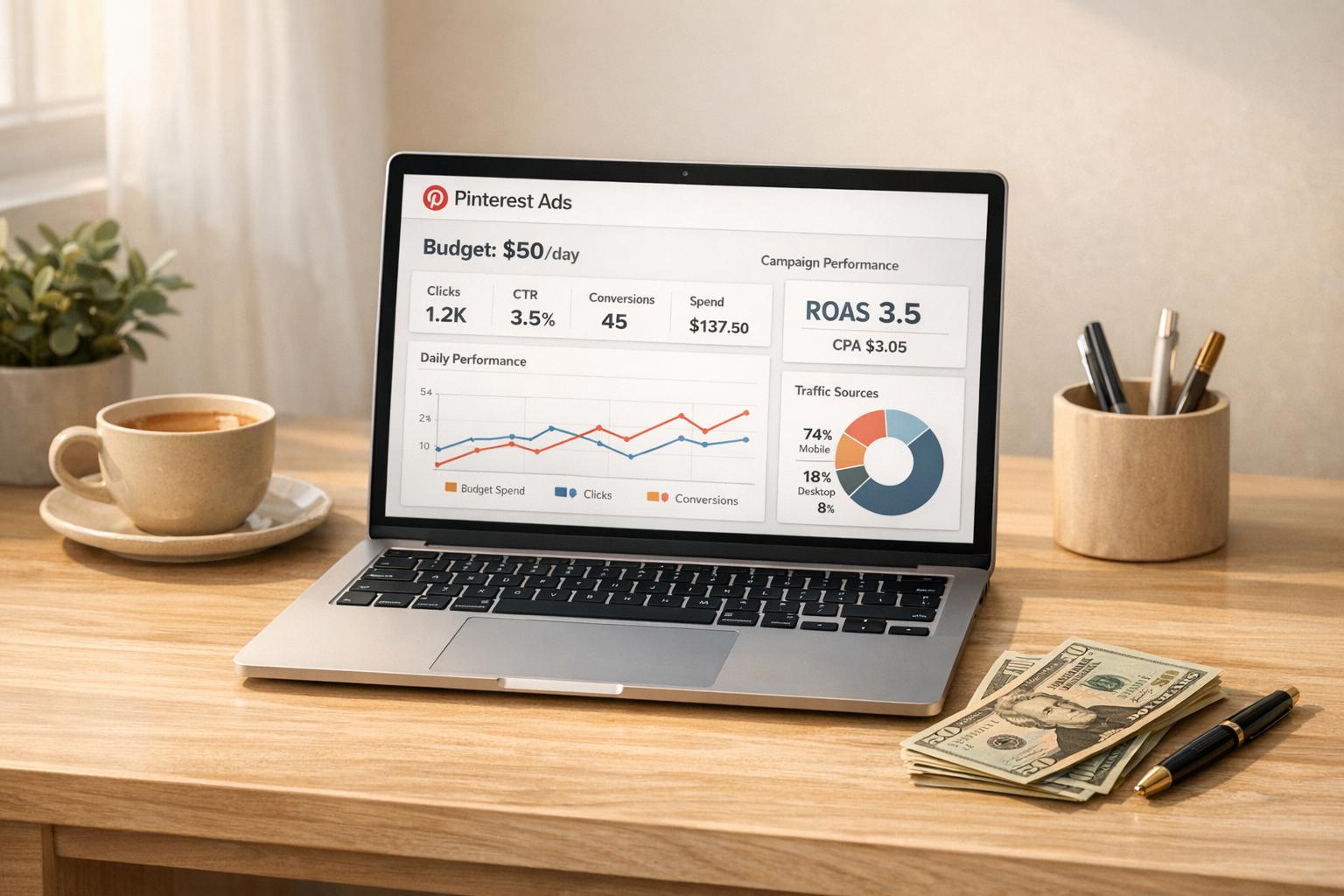Struggling with wasted PPC budgets? Up to 53% of PPC spend often goes to campaigns that deliver no conversions. Mismanagement, poor keyword choices, weak ad copy, and lack of oversight are the main culprits. Here's how to fix it:
- Audit campaigns regularly: 72% of companies skip audits, leading to wasted spend.
- Focus on high-performing keywords: Use metrics like ROAS and Quality Score to guide decisions.
- Allocate budgets smartly: Reserve 10-20% for testing and optimization.
- Write better ad copy: Retargeting ads can boost clicks by 76% and conversions by 70%.
- Refine bidding strategies: Use manual, enhanced, or automated bidding based on your goals.
Start by analyzing your campaigns, reallocating budgets, and focusing on top-performing strategies to improve ROI. PPC success lies in continuous optimization and data-driven decisions.
How to Prioritize PPC Campaign Budgets For New Product Launches
Why PPC Budgets Underperform
PPC campaigns often fall short because of a few common mistakes that waste money without delivering the desired outcomes. Recognizing these issues is the first step to improving results.
Budget Distribution Problems
One major challenge is how funds are spread across campaigns and platforms. Different platforms come with varying costs , and mismanaging this can quickly drain your budget.
The real problem? Spreading funds too thinly or not reserving enough for testing and adjustments. Experts suggest setting aside 10-20% of your PPC budget for experimentation and optimization , but many advertisers fail to do this effectively.
"Your landing page shouldn't only show your products, it should show potential customers what using your product will look like for them and how it'll solve their problems." - Talia Wolf, founder of GetUpLift
Poor Keyword Choices
Picking the wrong keywords is another big money waster. Advertisers often focus on broad, high-traffic keywords that bring in clicks but don’t convert into sales.
Here’s a look at average costs per click on major platforms:
| Platform | Average CPC |
|---|---|
| LinkedIn Ads | $5.26 |
| Google Ads (search) | $2.69 |
| Bing Ads | $1.54 |
| Amazon Ads | $0.91 |
| Facebook Ads | $0.83 |
| Google Ads (display) | $0.63 |
Weak Ad Copy
Bad ad text can hurt your campaign in two ways: fewer clicks and higher conversion costs. Many advertisers rely on generic messaging that doesn’t connect with their audience.
The numbers don’t lie: retargeting ads are 76% more likely to get clicks than standard display ads, and people are 70% more likely to convert after being retargeted . This shows how important it is to write ads that align with what your audience wants.
Lack of Budget Oversight
Mismanagement of funds is another major issue. With an average e-commerce conversion rate of just 2.5% to 3% for first-time visitors , it’s critical to focus your budget on campaigns that bring in qualified leads.
"Finding more PPC keywords that attract the right audiences will lead to more high-value metrics like conversions - and that's one of the biggest factors of your PPC success."
Regularly reviewing and reallocating your budget based on performance is key. These common missteps highlight the importance of closely monitoring your spending and making adjustments as needed.
sbb-itb-89b8f36
Finding and Fixing Budget Problems
Campaign analysis helps uncover where budgets are being wasted and how to redirect funds more effectively. Did you know about 41% of ad spend goes to waste? This makes a structured approach to analysis essential .
Run Campaign Audits
A surprising 72% of companies skip regular PPC audits . Running a detailed audit can reveal areas of wasted spending and performance gaps:
-
Set Clear Objectives
Define what you want to achieve with the audit. Analyze at least three months of data to spot patterns and trends . -
Review Core Metrics and Campaign Setup
Compare your metrics against industry averages and ensure campaign settings match your target audience's needs. Here's a quick reference table:
| Metric | Industry Average | Notes |
|---|---|---|
| Click-Through Rate | 3.17% | |
| Conversion Rate | 3.75% | |
| Bounce Rate | 62.2% | Anything above this suggests poor performance |
| Average CPA | $48.96 |
"The wrong location setting, keyword match type, or exclusion list can result in significant wasted spend over time."
After completing your audit, dive deeper into keyword performance to identify specific areas that need improvement.
Check Keyword Results
Keep an eye on essential metrics like Cost Per Click (CPC), Quality Score, and Return on Ad Spend (ROAS). If CPC rises, check ad relevance through Quality Score. Use ROAS to separate high-performing keywords from those that cost more but deliver fewer conversions.
Update Bids and Spending
Testing and tweaking bids is key to improving value. Choose a bidding strategy that fits your goals and expertise:
- Manual CPC – Full control, but requires hands-on management
- Enhanced CPC – Adds automated adjustments while keeping some manual control
- Automated Bidding – Uses machine learning to optimize for specific objectives
These bid adjustments, combined with insights from audits and keyword reviews, can help you get the most out of your campaigns.
Better Budget Management Methods
Once you've tackled budget issues through audits and bid adjustments, it's time to sharpen your strategy with more advanced management techniques.
With global ad spend expected to reach $870B by 2027 , these methods help you maximize returns by building on the insights gained during your audits.
Focus on Top Performers
Good PPC management can increase ROI by up to 200% . Concentrate on your best-performing campaigns to maximize returns, while reserving a small portion of your budget to test new ideas and opportunities.
Group Campaigns by Purpose
Organizing campaigns based on their purpose can make your budget work harder. For example, a Boston-based flag retailer improved efficiency by segmenting campaigns by language and location .
"As budget lives at the campaign level, anything needing to have a dedicated budget deserves its own campaign."
Refine Keyword Match Types
Fine-tuning keyword match types can have a noticeable impact on performance:
- Exact Match: Brings in 415% ROAS with a 21.66% CTR
- Phrase Match: Achieves 313% ROAS and a 9.31% conversion rate
- Broad Match: Delivers 277% ROAS with an 8.5% CTR
"We tend to lean towards exact and phrase match types for most campaigns to keep the campaign strategy as tight and targeted as possible, especially at the start. Once we gather enough statistical significance and have developed an extensive and strategic list of negative keywords, we may turn on broad match types. We're always monitoring performance closely and keeping an eye out for every optimization opportunity." – Sam Yadegar, HawkSEM's co-founder and CEO
For better targeting, prioritize exact and phrase match types . Pair these with negative keyword lists to filter out irrelevant searches and keep your campaigns focused .
Conclusion
Managing a PPC budget effectively requires a mix of close monitoring, smart adjustments, and strategic spending. With digital ad spending expected to hit $870 billion by 2027 , businesses need to focus on making data-driven decisions to get the most out of their investments.
Regular campaign audits and performance tracking help pinpoint weak spots and guide necessary changes. These reviews enable precise budget reallocations, leading to consistent improvements. By setting up strong budget controls and concentrating on top-performing campaigns, businesses could see ROI increases of up to 200% .
Tools like the Top PPC Marketing Directory can assist with campaign management, bid adjustments, and performance tracking, helping reduce expenses while improving overall results .
To avoid common budget pitfalls, conduct thorough audits and make strategic tweaks. Dedicate 10-20% of your PPC budget to experimenting with new strategies . Stay on top of trends and keep a close eye on campaign metrics to ensure your PPC efforts remain both competitive and cost-efficient.


